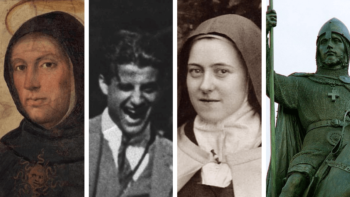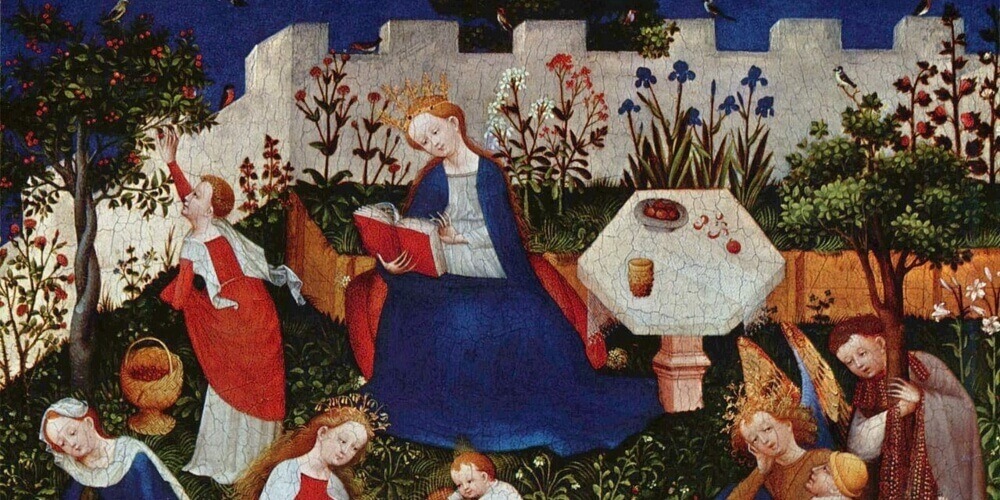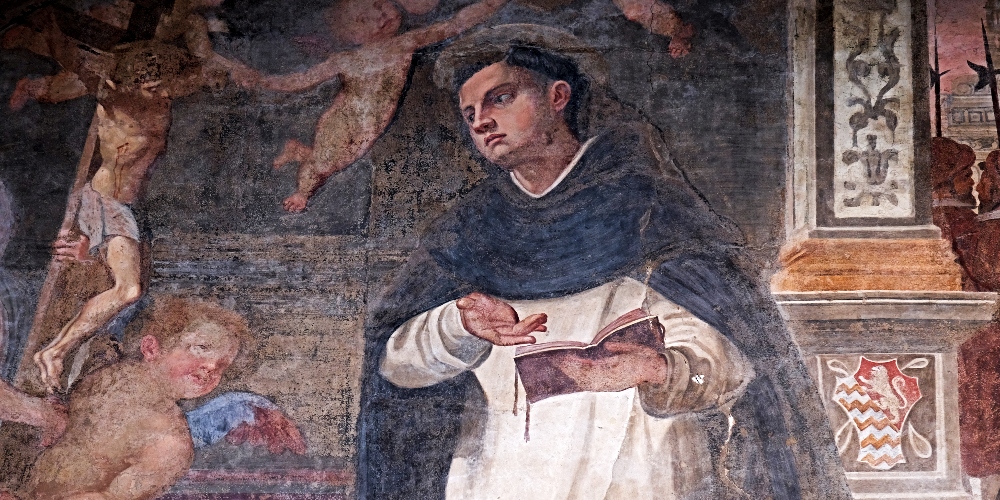
“Bestow upon me also, O Lord my God, understanding to know Thee, diligence to seek Thee, wisdom to find Thee, and a faithfulness that may finally embrace Thee. Amen.”
St. Thomas Aquinas
According to tradition, St. Thomas Aquinas died while writing a commentary on the Song of Songs. Brought to the glories of Heaven, St. Thomas Aquinas was fittingly called home while meditating on a book that serves as a love song.
Like every saint, there is much to be learned from St. Thomas Aquinas, whose particular contributions to the Catholic Church are immeasurable.
Due to his robust and penetrating work in theology and philosophy, the person of Aquinas can often be overlooked for the work of Aquinas. And when one does take time to consider this brilliant man’s life, it is easy to perceive only an astute philosopher and teacher, but miss the dynamic man whose heart and mind were illuminated by the Father’s love.
The Song of Songs sings of the joys of love in beautiful lyrical verses such as this one:
“O my dove, that art in the clefts of the rock, in the secret places of the stairs, let me see thy countenance, let me hear thy voice; for sweet is thy voice, and thy countenance is comely.”
Song of Songs 2:12
With his immense knowledge of Scripture, it is not difficult to imagine St. Thomas meditating on these verses from the Song of Songs. In fact, his own writings about his love for the Lord read as though they had been plucked from the Song of Songs.
According to tradition, St. Thomas was miraculously levitating in prayer when Christ spoke to him, asking:
“You have written well of Me, Thomas. What reward would you have for your labor?”
In response, St. Thomas Aquinas simply said: “Nothing but You, Lord!”
What love! May we all have such a resounding desire for Our Lord.
This devotion wasn’t merely manifest in this single moment of St. Thomas’s life, but this love is characteristic of his whole life and philosophy.
When celebrating St. Thomas Aquinas, it is appropriate to spend time ruminating on this love. In doing so, we shall see a beautiful example of a life motivated by love of the Father and the magnitude of wisdom that grows from such a rooted love.
The Early Life of St. Thomas Aquinas
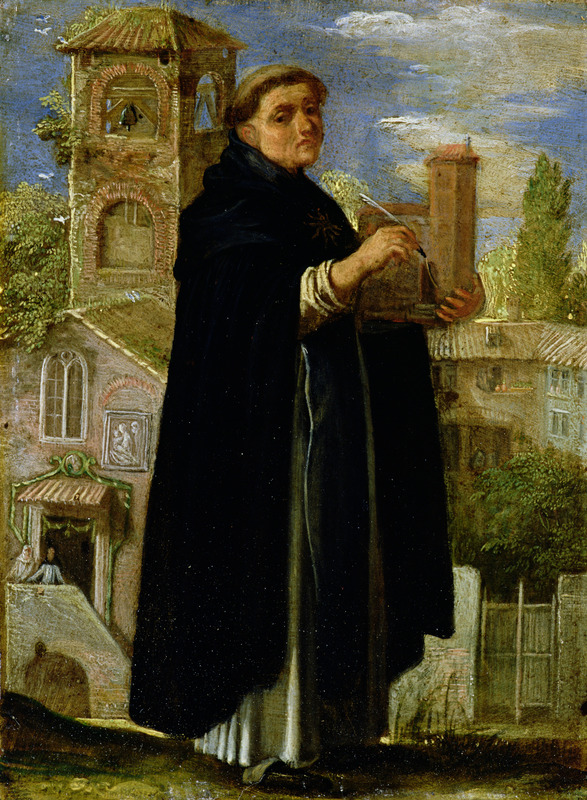
St. Thomas Aquinas was born to a noble family in Aquino, Italy. The youngest of eight children, St. Thomas was expected to enter religious life.
This expectation shaped Thomas’s childhood. He received a thorough and rigorous education. For Thomas, this education fueled him in love and faith. He grew to be a devoted man and felt the call to religious life personally, not merely out of family duty.
However, Thomas’s vocational call differed from his family’s expectations that he become a Benedictine.
The Benedictine order was well established by St. Thomas’s time. Founded in 529, the order had immense power and respect by the time of Thomas’s birth in 1225.
But Thomas was not called to be a Benedictine.
Rather, he heard God’s call to join the Order of Preachers, the Dominicans. The Dominicans, though sharing in a deep love of theology and an appreciation for teaching, differed from the Benedictines in several notable ways. Primarily, at least for Thomas’s family, the Dominicans were a very young order. Founded in 1212, 13 years before Thomas’s birth, the Dominicans only received papal approval in 1216. Because of this, and their commitment to a vow of poverty, the Dominicans had very little power in their region.
When Thomas expressed his desire to become a Dominican, he met with great resistance from his family—so great, in fact, that his father had Thomas kidnapped by his older brothers and locked in their family tower!
Tradition says that, hoping to break some of his religious fervor and will, Thomas’s family attempted to tempt him by sending a prostitute into the tower where he was being kept. They hoped that if he fell into sin, he would abandon the commitment he had to entering this uncertain religious order.

But like his desire to become a Dominican, Thomas’s commitment to virtue was not a fleeting thing—it was a firm resolution based on a burning love.
Thomas, resolved in his faith and his vocation, remained sure in his vow of chastity. As included in the official records for his canonization, Thomas drove the prostitute away wielding a burning log—with which he inscribed a cross onto the wall—and fell into a mystical ecstasy. Two angels appeared to him as he slept and said, “Behold, we gird thee by the command of God with the girdle of chastity, which henceforth will never be imperiled. What human strength can not obtain, is now bestowed upon thee as a celestial gift.” Like a bridegroom protecting his threatened bride, Thomas’s vocation and commitment to chastity was fueled by a love and a need to guard it at all costs.
Realizing her son’s decision to become a Dominican was a resolute one, his mother arranged for a window to be left open so that Thomas could escape. Climbing out of his window, Thomas left the comfort of his family’s money and power and began his life as a Dominican.
Enrolling at the University of Paris, Thomas studied under Albert the Great for three years. In 1248, Albert the Great was transferred to Cologne and St. Thomas followed. Under Albert, Thomas became deeply convinced that the Christian faith should not shy away from a profound engagement with philosophy and the sciences. St. Thomas, with his devout love of God and the Catholic Faith, recognized innately the necessity of deploying one’s whole being in faith, including one’s intellect and perception.
Thomas evidently flourished under Albert’s influence. In 1252, Albert nominated Thomas to pursue an advanced degree in theology, despite him being younger than the minimum required age. After four years as a bachelor of theology, Aquinas received his doctorate and was immediately appointed master of theology, once again at an earlier age than the statutes officially allowed. From 1256 until 1259, he held the Dominican chair of theology in Paris, preaching, lecturing on the Bible, and presiding over various philosophical and theological disputes.
Love in the Philosophy of St. Thomas
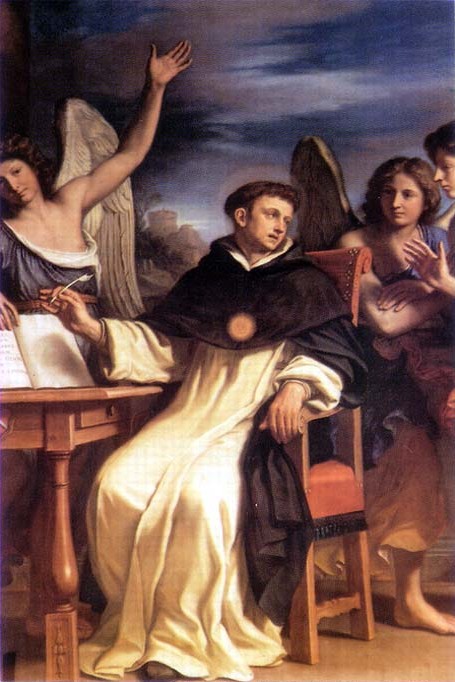
Those familiar with the Baltimore Catechism may remember this question:
“Why did God make you?”
The answer is simple: “God made me to know him, love him, and serve him”.
And this was the lifelong pursuit of St. Thomas Aquinas. Knowing God—St. Thomas committed his life to this pursuit, and in turn, he loved Him and served Him. But it was also that in loving God, St. Thomas came to know Him and to serve Him.
“The things that we love tell us what we are.”
St. Thomas Aquinas
At the time of his life, there was much dispute over the ability to know God. When human nature fell, reason fell with it. How then can we know God? Only through grace, Thomas’s contemporaries would say. But this did not satisfy St. Thomas Aquinas whose faith was strong but affirmed by what his reason could comprehend.
St. Thomas recognized not only that God was a perfect being, infinitely good and everlasting, but he recognized that in God’s goodness He created us good as well. This innate goodness wasn’t stripped from us in the Fall, but it was hindered by our own fallen nature. God gave us the capacity to reason, and in this capacity He gave us a means to know Him and to love Him. The use of our reason to discover God is called natural philosophy.
Though the gift of reason allows us to engage in natural philosophy, reason and natural philosophy, for St. Thomas, have their limit. For although natural reason can establish the existence of a perfect being, it is incapable of recognizing the love and personal aspects that distinctively characterize the Christian God. These realities about our Heavenly Father, such as God’s triune nature and God’s incarnation as a human being, require revelation in order to be understood. At the outset of the Summa Theologia, St. Thomas writes that “it was necessary for the sake of human salvation that certain truths that surpass human reason be made known to us through divine revelation.”
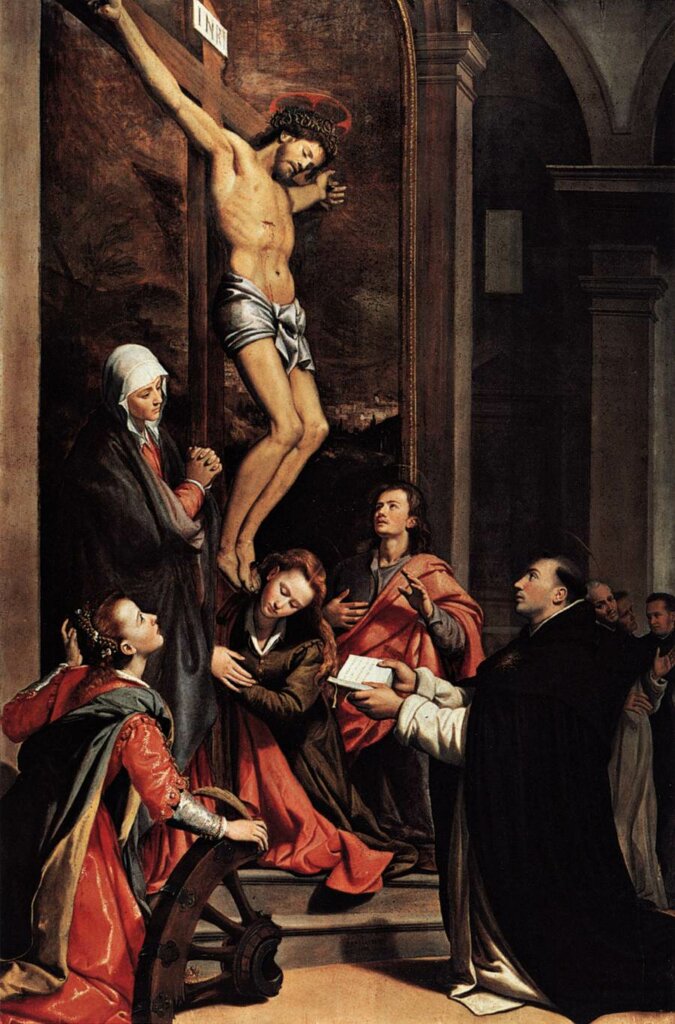
St. Thomas’s distinction emphasizes the Father’s love for us. Not afraid of the difficult subject manner he was addressing, St. Thomas does not minimize or reduce the complexity of the topic, but within all his writings there is a pulse of the Divine Love which motivated and illuminated St. Thomas Aquinas. Committed to the belief that God has created us for a relationship with Him, and with the capacity to reason towards His existence, St. Thomas still maintains the necessity of faith and revelation. This necessity of faith is not merely because of the complexity of God’s perfect existence, but because faith and revelation allow for us to enter into a relationship with the Father. A relationship where He gives us His Incarnate Son, Sacred Scripture, and faith so that we can freely choose to enter into this relationship. Reason is a beautiful gift, yes, but faith and revelation allow for one’s ready rejection, they allow for one’s willing participation. In emphasizing the necessity of both natural and revealed theology, St. Thomas is able to emphasize the great gifts God has lovingly given us. Moreover, St. Thomas allows us to see that by giving us revealed theology, God has opened up knowledge for everyone. He writes that without Divine Revelation, “the truth about God investigated by reason would be available only to a few people, after a long time, and with the admixture of many errors.”
It is out of a great love for all mankind that God has given us Divine Revelation. It is no wonder that in studying the immensity of this gift, St. Thomas would grow in love for the Father in return.
“Give us, O Lord, a steadfast heart, which no unworthy affection may drag downwards; give us an unconquered heart, which no tribulation can wear out; give us an upright heart, which no unworthy purpose may tempt aside. Bestow upon us also, O Lord our God, understanding to know you, diligence to seek you, wisdom to find you, and a faithfulness that may finally embrace you; through Jesus Christ our Lord.”
St. Thomas Aquinas
The life and studies of St. Thomas Aquinas can seem foreign to us living and studying in the 21st century. It is common to hear remarks from educators such as “knowledge is power” and implorations on the utility of education.
Rather than implore knowledge for his own sake, St. Thomas Aquinas was driven to the heights of philosophy and theology by love. The commitment to love someone or something, is the commitment to grow in knowledge of that thing. When we love something, we should be gently guided, like St. Thomas Aquinas, to the honest pursuit of the truth of that thing. Humbly, submitting ourselves to the lifelong service of this pursuit, and with the willingness to recognize the innate mystery of this life, a mystery that cannot be understood with reason alone but will require a formidable faith.
May we, like St. Thomas Aquinas, humbly recognize our Heavenly Father as the ultimate object of both our pursuit of love and truth.
May we, like St. Thomas Aquinas, live our lives as perpetual students, filling our hearts with wonder, our minds with discipline, and embracing humbly our Heavenly Teacher.
St. Thomas Aquinas, pray for us!



